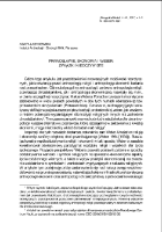Tytuł pozycji:
Prawosławie, ekonomia i Weber: związki nieoczywiste
The article investigates the innovative potential embedded in the anthropological reflection on Eastern Christianity and its possible impact on theoretical conceptualizations currently prevailing the scholarship on anthropology of religion and anthropology of economy. Both of these subfields of anthropology owe much to Max Weber. Weber’s framework underlined the economic ethic (Wirtschaftsethik) of Protestantism as the key to the genesis of modernity, secularity, and European exceptionalism, but an inadvertent result of this line of thought is the emphasis on Protestantism which dominated anthropological reflection on religion. Another corollary of Weber’s influence is the link between material/financial success and interiorized belief which occupies a special position in anthropological/theoretical meta-representations. However, the Eastern Christian perspective offers an alternative viewpoint on matters of materiality, individual and collective conceptualizations of personhood, pertinence of belief, and salvation. Yet, Weber’s influence remains fundamental in the way his thought constitutes anthropological common sense, and, consequently, forms a methodological and theoretical impediment to anthropological study of Eastern Christianity. The article discusses the ethnocentrism of the ‘elective affinities’, i.e. the entanglement of concrete theoretical conceptualizations the social theory owes to Weber and highlights Eastern Christianity as a vantage point for comparative research leading to tantalizing theoretical innovations
24 cm
